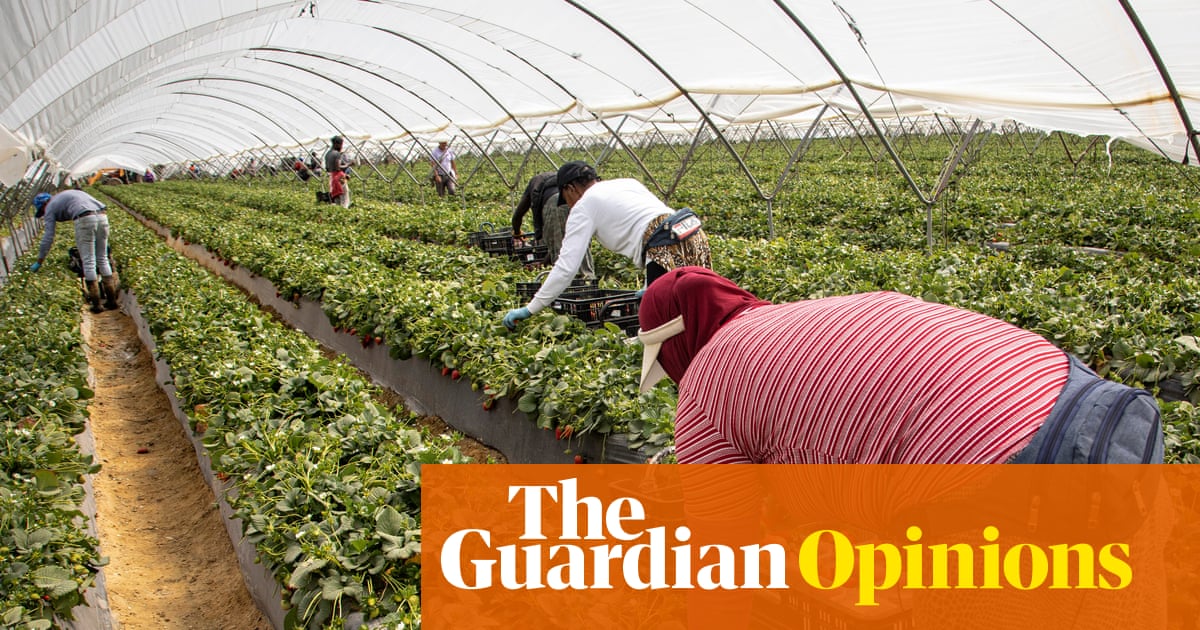
I used to enjoy being able to buy strawberries in the supermarket in winter. But that was before I saw first-hand where most of the UK’s imported berries come from. The working conditions of migrant farm workers in southern Spain were something I never thought I would see in a European country. While others flounder, the Spanish economy is booming, in large part thanks to unusually high migration levels – but too many of the people propping it up are being treated disgracefully.
At the end of Huelva’s berry-growing season in April, I sat having lunch at a roadside restaurant in town, as an endless stream of trailers with fruit logos on the side thundered past. At peak times, 2,000 of these lorries leave Huelva every day, laden with berries destined for the European market. More than 60% of the strawberries British people eat in winter were grown in the polytunnels in Huelva.
The 11,000-hectare (27,000-acre) sprawl there is surrounded by roughly 40 chabolas, makeshift slums housing thousands of migrant workers. According to Diego Cañamero, co-founder of Soc-Sat, the Andalusian Workers’ Union, 40% of Huelva’s seasonal work force of 100,000 are undocumented. Without paperwork, the workers cannot rent accommodation, and so thousands are forced to live in shacks made of scraps scavenged from waste dumps, with no running water or electricity.
Cañamero put me in touch with a local union official, who took me around the enormous sprawl of polytunnels and surrounding chabolas. He asked not to be named – he told me he had been attacked because of his organising efforts. Spain’s berry exports are worth upwards of £1.5bn a year, so there are powerful forces at work here. Indeed, it didn’t take long before our car was being followed. At some farms, often with no company name displayed, we were welcomed by workers, but some were hostile, unwilling to speak to a journalist for fear of losing their jobs.
In 2019, the union received more than 1,000 complaints related to working conditions in Huelva. Six years on, things have not improved. There are farms that treat their workers fairly and pay a decent wage, but most don’t, my union guide said. Most berry pickers are from Morocco and sub-Saharan Africa, but there are also South Americans and eastern Europeans. Research conducted by Ethical Consumer in 2023 found that workers are often paid less than the Spanish minimum daily wage of about £45, and are regularly required to work overtime without pay.
Two Moroccan women took me into their dwelling, a shipping container in a forest clearing between broken-down cars and washing lines. They spoke no Spanish or English, but when one pointed to a stinking hole in the floor and said “kaka”, the mosquitoes and flies spoke for themselves. In Huelva, the rightwing myth of migrants stealing jobs is dispelled; few if any Spaniards would work under these slavery-like conditions. This has not stopped Spain’s far-right party Vox proposing a new Trump-inspired plan for mass deportations.
Inside the vast expanse of polytunnels, pesticides keep insects at bay. I witnessed workers wearing no protective clothing or masks while spraying the plants with these chemicals. The heat was fierce, but many farm bosses don’t allow workers to bring in bottled water, claiming it could ruin the crops. Some labourers are electronically monitored, and are deducted pay for low efficiency and toilet breaks, according to the 2024 documentary The Invisibles: Modern Slavery in Europe. I also met women on two-hour walks from their slums to the nearest shop, wary of hitchhiking because of several incidents of sexual harassment.
Spain has an estimated 9.3 million foreign-born people, almost 20% of the population. And according to economists at JP Morgan, the country’s unusually pro-migration stance has been critical to its low unemployment levels and soaring GDP, as migrant workers fill the gaps left by an ageing Spanish population – in particular, in the critical industries of tourism and agriculture. Indeed, it is doing so well that The Economist named it the best in the world in 2024.
But who is looking out for the workers who are suffering so that their host country can thrive, and the rest of Europe can eat summer fruits in the depths of winter? Roughly 600,000 of Spain’s migrant workers are undocumented – although Pedro Sánchez’s government has pledged to naturalise 300,000 of them every year, which could be a step in the right direction to improve their working conditions.
It will need a concerted effort to alleviate the miserable situation many workers are trapped in. The trade union has proposed much stronger regulation of agricultural employment, with a requirement for companies employing foreign workers to ensure they have a basic level of housing and a living wage. So far, Cañamero told me, they have been met with total silence. The Spanish labour ministry says it carried out more than 4,000 inspections in Huelva in 2022, issuing €1.6m worth of fines.
Unfortunately, farm bosses are often alerted to these inspections beforehand. Soc-Sat has proposed to the ministry of labour that they carry them out unannounced, but to no avail. Nothing ever seems to change there, my union guide told me, even after 20 years of journalists documenting the strawberry-pickers’ undignified conditions.
While Spain celebrates its widely envied GDP growth and the plaudits of the economic establishment, and Europe’s supermarkets count the profits from year-round grocery sales, the people doing the punishing work that supports it are suffering appalling working conditions and living in slums. These imported strawberries should leave a bitter taste in all our mouths.
-
Tone Sutterud is a freelance human rights and environment journalist and translator








